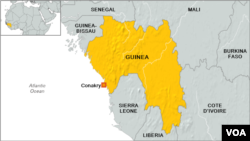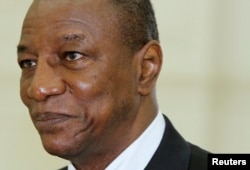CONAKRY —
At least eight people have been killed in ethnic violence in southeastern Guinea which entered a second day on Tuesday, witnesses said, underscoring tensions in the West African nation ahead of parliamentary elections.
In Nzerekore, Guinea's second largest town, ethnic gangs prowled the streets and witnesses reported shooting. The violence erupted on Monday after a man accused of being a thief was killed in the nearby town of Koule, residents said.
“Everything is closed: the market, banks, shops. People have stayed at home,” said Ousmane Balde, a resident of Nzerekore, which lies some 980 km (612 miles) from the capital Conakry.
A second source, who asked not to be identified, said he had seen at least eight dead at the city's hospital. Most of them were killed with machetes and one appeared to have been burned alive, the source said.
Alpha Saliou Diallo, a local radio journalist, said hospital sources were citing at least 11 dead and 50 people injured.
It was not possible to reach the hospital by telephone.
After months of deadlock and deadly clashes, often ethnically-driven, Guinea's political leaders have agreed to hold a long-overdue parliamentary election on September 24.
The poll is meant to be the final step in the return to civilian rule in the mineral-rich nation after a 2008 coup.
President Alpha Conde won a 2010 presidential election but his rivals accuse him of trying to rig the planned legislative vote. Conde draws support from Guinea's second-largest ethnic group, the Malinke, while the opposition is backed by the Peul, who account for around 40 percent of the population.
Mining firms have signed multi-billion-dollar deals in a bid to secure untapped mineral riches, especially iron ore, but political instability has led to some investment being frozen.
The region hit by the clashes is near Guinea's porous border with Liberia, Ivory Coast and Sierra Leone, all nations that are in the process of recovering from conflicts of their own.
In Nzerekore, Guinea's second largest town, ethnic gangs prowled the streets and witnesses reported shooting. The violence erupted on Monday after a man accused of being a thief was killed in the nearby town of Koule, residents said.
“Everything is closed: the market, banks, shops. People have stayed at home,” said Ousmane Balde, a resident of Nzerekore, which lies some 980 km (612 miles) from the capital Conakry.
A second source, who asked not to be identified, said he had seen at least eight dead at the city's hospital. Most of them were killed with machetes and one appeared to have been burned alive, the source said.
Alpha Saliou Diallo, a local radio journalist, said hospital sources were citing at least 11 dead and 50 people injured.
It was not possible to reach the hospital by telephone.
After months of deadlock and deadly clashes, often ethnically-driven, Guinea's political leaders have agreed to hold a long-overdue parliamentary election on September 24.
The poll is meant to be the final step in the return to civilian rule in the mineral-rich nation after a 2008 coup.
President Alpha Conde won a 2010 presidential election but his rivals accuse him of trying to rig the planned legislative vote. Conde draws support from Guinea's second-largest ethnic group, the Malinke, while the opposition is backed by the Peul, who account for around 40 percent of the population.
Mining firms have signed multi-billion-dollar deals in a bid to secure untapped mineral riches, especially iron ore, but political instability has led to some investment being frozen.
The region hit by the clashes is near Guinea's porous border with Liberia, Ivory Coast and Sierra Leone, all nations that are in the process of recovering from conflicts of their own.






